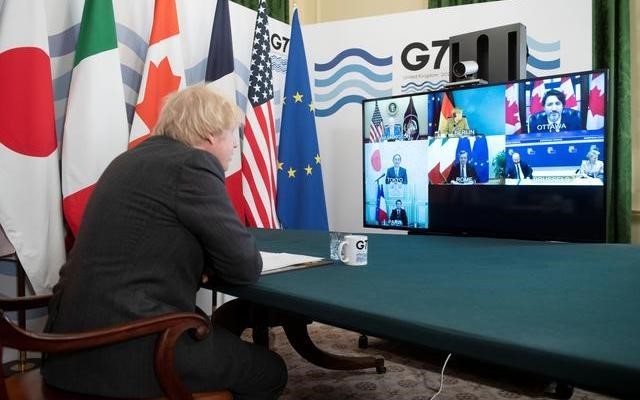(VOVWORLD) - At the just-concluded G7 Summit, world leaders pledged to strengthen cooperation in COVID-19 response and eliminate vaccine nationalism. They agreed to increase funding for the WHO-initiated global vaccine distribution program COVAX to 7.5 billion USD and share the vaccines they ‘ve already ordered with developing countries.
 British Prime Minister Boris Johnson chairs the G7 online summit, Downing Street, London, February 19, 2021. (Photo: VNA) British Prime Minister Boris Johnson chairs the G7 online summit, Downing Street, London, February 19, 2021. (Photo: VNA)
|
Joint response to challenges
The message delivered at the G7 Summit was that the fight against COVID-19 would be futile if people in the rich world get vaccinated while people in the developing countries are denied access to vaccines. They said it’s now urgent to work together and to make sure that the whole world is vaccinated.
As the G7’s rotating president, the UK has led joint effort, pledging to give more than half of its surplus vaccine to developing countries through the COVAX program. European Commission President Ursula von der Leyen announced that the European Union (EU) will double its financial contribution to COVAX to 1 billion euros. All EU countries have contributed directly to the COVAX program. Germany pledged an additional 1.5 billion euros for vaccination, diagnosis and treatment. France promised to share up to 5% of its vaccines with developing countries.
US President Joe Biden pledged to give an additional 4 billion USD to COVAX. billion USD will be disbursed immediately, but vaccines will be shared only after all Americans have been vaccinated.
China has donated more than 420 million vaccine doses to 27 countries, and Russia has given nearly 390 million doses to 20 countries. India, the world's largest vaccine manufacturer, is working to distribute COVID-19 vaccines to neighboring countries as well as low- and middle-income countries in Africa.
Vaccine nationalism decried
The global race to obtain vaccines began to heat up this year when numerous vaccine studies were declared successful and vaccines were put into production. Rich countries had already ordered in bulk when the vaccines were still in trials. Poor, developing countries have had to wait and now must bid for vaccines. Some 130 countries have had no access yet to any vaccine.
To defeat the pandemic, the distribution of vaccines must be equitable. Only when vaccines are available to everyone, will trade return to normal, enabling a global economic recovery. The key to ending the global pandemic is for countries to stay united and resist discrimination in vaccine distribution.
WHO Director-General Tedros Adhanom Ghebreyesus warned that “vaccine nationalism is not just morally indefensible. It is epidemiologically self-defeating and clinically counterproductive.”
The WHO chief emphasized that the pandemic will not be over anywhere until it is over everywhere. This is the reality of an interconnected world, and that reality can be met only by a reaffirmation of solidarity and an inclusive public-health order that distributes vaccines globally, quickly, and equitably,” he said.